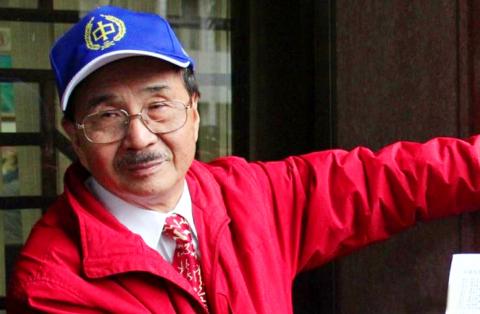A 25-minute investigative documentary aired by Qatar-based al-Jazeera TV has shed some light on how pro-unification groups operate in Taiwan, including by reportedly paying people to attend events and asking the police for the names of independence advocates.
The documentary was produced by Lynn Lee (李成琳) and seeks to draw attention to activities of pro-unification groups in Taiwan, most notably the Concentric Patriotism Association (CPA, 愛國同心會) and the China Unification Promotion Party (CUPP), whose members have grabbed headlines by attacking independence advocates and Falun Gong members staging a sit-in outside Taipei 101.
The network sent an undercover reporter posing as a Chinese visitor to Taiwan in an attempt to infiltrate the CPA.

Photo: Chen Wei-tse, Taipei Times
During the reporter’s conversations with CPA executive director Zhang Xiuye (張秀葉), a Chinese immigrant, Zhang told him that the association paid people between NT$800 and NT$900 per day to wave the national flag of the People’s Republic of China.
Zhang told the reporter that it is illegal to take money from China, but it is legal to accept money from China-based Taiwanese businesspeople, such as CPA head Zhou Qinjun (周慶峻), who she said would often receive “special care” from the Chinese government.
“Authorities in China know which businesses support unification and they will do their best to make sure you do not lose money,” Zhang told the reporter.
The CPA is very careful when recruiting people, requesting that they show their Chinese identification cards, apparently out of fear that members might disclose its activities to outsiders, the documentary said.
“I don’t trust Taiwanese. I only trust Chinese, because as Chinese we all have relatives in China,” Zhou said. “You cannot disclose what we do here to outsiders. If you do that, you might not be affected, but your relatives in China will get hurt.”
The researcher also filmed a telephone conversation between Zhou and what appeared to be a Taiwanese police officer, in which the CPA head asked the officer for a list of names of people who support independence at his precinct.
“First, I hope to get a list of independence supporters. Second, I’m sending him a warning: Don’t think about being pro-independence or I’ll come after you,” Zhou said after the telephone call.
As for the operations of the CUPP, a CPA member said that triads were using the party to “whitewash” their reputations.
“Right now, all kinds of triads are in the CUPP. Why have they joined the party? There is only one reason: to whitewash their reputations,” the member said. “They can have a sign that says they’re a CUPP branch office, but inside it is a triad branch.”
CUPP founder Chang An-le (張安樂), the former Bamboo Union (竹聯幫) gang leader known as the “White Wolf,” is facing investigations for allegedly receiving funding from China to carry out destabilizing activities in Taiwan.
When contacted yesterday, National Police Agency officials said they needed to verify the details of the al-Jazeera report and could not yet respond to the allegations.
Mainland Affairs Council Deputy Minister Chiu Chui-cheng (邱垂正) said that while Taiwan is a democratic and free nation where different political stances are respected, the council opposes the use of violence or coercive means for any political causes.
Additional reporting by Jason Pan

SECURITY: As China is ‘reshaping’ Hong Kong’s population, Taiwan must raise the eligibility threshold for applications from Hong Kongers, Chiu Chui-cheng said When Hong Kong and Macau citizens apply for residency in Taiwan, it would be under a new category that includes a “national security observation period,” Mainland Affairs Council (MAC) Minister Chiu Chui-cheng (邱垂正) said yesterday. President William Lai (賴清德) on March 13 announced 17 strategies to counter China’s aggression toward Taiwan, including incorporating national security considerations into the review process for residency applications from Hong Kong and Macau citizens. The situation in Hong Kong is constantly changing, Chiu said to media yesterday on the sidelines of the Taipei Technology Run hosted by the Taipei Neihu Technology Park Development Association. With

CARROT AND STICK: While unrelenting in its military threats, China attracted nearly 40,000 Taiwanese to over 400 business events last year Nearly 40,000 Taiwanese last year joined industry events in China, such as conferences and trade fairs, supported by the Chinese government, a study showed yesterday, as Beijing ramps up a charm offensive toward Taipei alongside military pressure. China has long taken a carrot-and-stick approach to Taiwan, threatening it with the prospect of military action while reaching out to those it believes are amenable to Beijing’s point of view. Taiwanese security officials are wary of what they see as Beijing’s influence campaigns to sway public opinion after Taipei and Beijing gradually resumed travel links halted by the COVID-19 pandemic, but the scale of

A US Marine Corps regiment equipped with Naval Strike Missiles (NSM) is set to participate in the upcoming Balikatan 25 exercise in the Luzon Strait, marking the system’s first-ever deployment in the Philippines. US and Philippine officials have separately confirmed that the Navy Marine Expeditionary Ship Interdiction System (NMESIS) — the mobile launch platform for the Naval Strike Missile — would take part in the joint exercise. The missiles are being deployed to “a strategic first island chain chokepoint” in the waters between Taiwan proper and the Philippines, US-based Naval News reported. “The Luzon Strait and Bashi Channel represent a critical access

Pope Francis is be laid to rest on Saturday after lying in state for three days in St Peter’s Basilica, where the faithful are expected to flock to pay their respects to history’s first Latin American pontiff. The cardinals met yesterday in the Vatican’s synod hall to chart the next steps before a conclave begins to choose Francis’ successor, as condolences poured in from around the world. According to current norms, the conclave must begin between May 5 and 10. The cardinals set the funeral for Saturday at 10am in St Peter’s Square, to be celebrated by the dean of the College